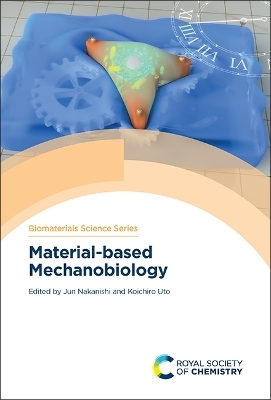
Material-based Mechanobiology
Royal Society of Chemistry (Verlag)
978-1-83916-185-8 (ISBN)
Mechanobiology is a new research field that investigates how the physical forces and changes in mechanical properties of cells and tissues contribute to their development, physiology and disease. One unique feature in the mechanical regulation, distinct from chemical/biochemical one, is that it can directly react with the multi-layered architectures of living systems, ranging from nano-scale proteins, subcellular organelles, cells, tissues, organs to whole bodies; one could term it “mechanoarchitectonics”. Another important aspect is its time-dependent dynamic feature. Not only time evolution in cells and extracellular matrices, but their intrinsic viscoelastic nature makes mechanical interaction dissipative and such feature is critical in cellular mechanical responses.
This book focuses on recent progress in mechanobiology from the materials science perspective, encompassing innovative material designs for force measurements and actuation to resolve dynamic mechanobiology and mechanoarchitectonics, by better mimicking physiologically relevant and time-evolving cellular mechanical environments. It also shows the marriage between cutting-edge materials science which enable spatiotemporal manipulation of material and cell dynamics in multi-dimensions and molecular biological techniques such as genome editing and next generation sequencing for cell fate/motility engineering and disease modelling, with the aim of providing valuable insights into the latest technological advances and discoveries in areas such as stem cell, fibroblast, heart, tumour, and epithelial mechanobiology.
Edited by leaders in the field, this book will be suitable for a broad range of readers, including materials scientists, biomaterial and biomedical engineering researchers and those working in chemical and mechanical engineering to expand possibilities of system designs for the developments of medical technologies based on mechanobiology.
An Introduction to Material-based Mechanobiology;On the Molecular Basis of Cellular Mechanobiology;Mechanotransduction at the Cell Surface and Methods to Study Receptor Forces;Measurement and Manipulation of Cellular Forces Using Silicone Elastomers;Geometric Cues for Directing Cell Fate;Dynamic Interfaces for Mechanobiological Studies;Micro- and Nanopatterned Substrates for Studies on the Mechanobiology of Cell–Matrix Adhesions;Role of Topographic Cues in Engineering the Muscle Niche;Engineered Substrate with Dynamically Tunable Topography;Curvature Mechanobiology;Dynamic Hydrogel;Manipulation of Durotaxis on a Matrix with Cell-scale Stiffness Heterogeneity;Engineered 3D Matrices with Spatiotemporally Tunable Properties;Combining Genetic and Mechanical Factors to Model Disease
| Erscheinungsdatum | 16.08.2022 |
|---|---|
| Reihe/Serie | Biomaterials Science Series ; Volume 12 |
| Verlagsort | Cambridge |
| Sprache | englisch |
| Maße | 156 x 234 mm |
| Gewicht | 693 g |
| Themenwelt | Naturwissenschaften ► Biologie ► Genetik / Molekularbiologie |
| Naturwissenschaften ► Physik / Astronomie ► Angewandte Physik | |
| Technik ► Maschinenbau | |
| ISBN-10 | 1-83916-185-X / 183916185X |
| ISBN-13 | 978-1-83916-185-8 / 9781839161858 |
| Zustand | Neuware |
| Haben Sie eine Frage zum Produkt? |
aus dem Bereich


